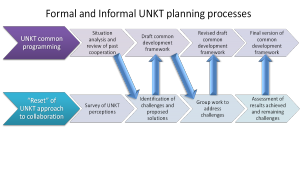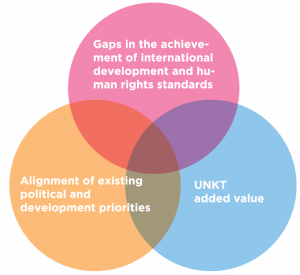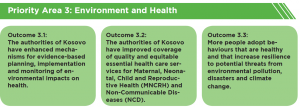WHAT WE DO
What is United Nations Common Development Plan?
Since the late 1990s, UN agencies, funds and programmes have been working alongside the institutions and people of Kosovo to address the most acute outcomes of conflict and poverty. UN agencies, funds and programmes have joined forces under the umbrella of the UN Kosovo Team, and coordination efforts are led by the UN Development Coordinator, who also serves as UNDP Resident Representative.
The UN Kosovo Team is firmly committed to working with its partners in Kosovo to identify and achieve their development aspirations and goals. The Team will also partner with public institutions, civil society, and communities to facilitate Kosovo’s engagement in the achievement of the new global development agenda, the Sustainable Development Goals, over the next fifteen years. This strong commitment to connecting local aspirations to global development goals underpins the United Nations Common Development Plan 2016-2020 (UNCDP), a five-year programmatic framework that lays out the shared strategic priorities of the UNKT. The Plan serves as a tool for drawing upon the full range of expertise and resources from the United Nations Programmes, Funds and Agencies in the design and implementation of joint UN programmes and towards the achievement of shared goals. The Plan also outlines how the UN Kosovo Team will implement the global UN “Delivering as One” approach.
How it was designed?
The UNCDP was designed via a two-track approach. The design phase combined traditional analysis and formal consultations with informal efforts to redesign the ways in which members of the UN Kosovo Team collaborate as a team. The process taken was a light one that allowed for the fostering of new mental models, behaviours and relationships, allowing the Team to construct less formal, and increasingly organic and fluid approaches to collaboration and working strategies. The process also highlighted the importance of creating the necessary space for collective thinking, learning and action.

What are the expected results?
The results set out in the UNCDP serves as a mutual accountability framework for the UN Kosovo Team and its implementing partners in Kosovo. It is closely aligned to both the Sustainable Development Goals as well as Kosovo’s European integration agenda. By focusing its combined resources on strengthening governance and rule of law, social inclusion, and environment and health, the UN Kosovo Team seeks to leverage its unique, comparative advantages in pursuit of positive and transformative changes that will benefit all Kosovars, such as higher quality primary and secondary education and better health services for all.
The previous UNCDP 2011- 2015 contributed to addressing key issues for many Kosovars, but proved to be overly ambitious in a context of reduced Official Development Assistance (ODA).The new UNCDP presents a more realistic and simplified picture of how the UN will work strategically for Kosovo over the coming years. .
Linkages with global and local agendas
The international development community continues to support stability, peace and economic progress in the region. Discussions on the Sustainable Development Goals, the European Union Stabilization Association Agreement (SAA) and Kosovo’s Medium Term Expenditure Framework (MTEF) 2016-2018 are amongst the frameworks governing Kosovo’s ambitions for a better future.
The UNCDP 2016–2020 is based on a clear set of guiding principles. First, it considers Kosovo’s aspirations for middle-income status while recognizing that this goal is hampered by poverty, corruption and discrimination. It draws upon lessons learned from Kosovo’s participation in the Post-2015 development debate and design of the Sustainable Development Goals. More than 9,000 Kosovars were consulted during the two phases of consultations in 2013 and 2014. These conversations highlighted that Kosovo’s biggest challenges are also its greatest opportunities: for example, its “demographic dividend” i.e. the 45 percent of its population under the age of 18 years who have yet to achieve their full potential.
Analytical framework for identifying UNCDP priority areas

The UNCDP assumes that Kosovo’s population is striving not just for education, employment and health systems that are fair and accessible, but also for stronger social cohesion, and closer relationships between institutions and communities. To meet these aspirations, the UN Kosovo Team will promote cross-sectoral cooperation in all of its programmes and will seek to accelerate inclusion for the most vulnerable within Kosovar society.
Finally, the UNCDP recognizes the clear limits of the UN’s capacity to help address Kosovo’s development and human rights challenges. With an approximate $30 million contribution for joint programmes for the next five years, the UN Kosovo Teams sees its role as a modest one and will seek to combine the its technical and financial resources with those of its partners. Ultimately, the UNCDP will help to align the collective efforts of the UN Kosovo Team in support of more effective implementation of existing policies and strategies for social inclusion, good governance, environment and health.
The UNCDP priority areas
The UNCDP addresses three strategic priority areas: 1. Governance and Rule of law –with a focus on strengthening access to services and promoting greater accountability and transparency as the basis for improved governance, a sound judiciary and inclusive security for all especially for the vulnerable, such as refugees and migrants; 2. Social inclusion –with a focus on empowering women, youth and other vulnerable groups to demand and enjoy better access to higher quality services for improving their economic status and social well-being; 3. Environment and Health – with a focus on reducing immediate health challenges while also boosting long term resilience to climate change and other environmental challenges. All three priority areas will also support ongoing dialogue on these critical issues between communities and the authorities who serve them.



The implementation and oversight structures
Three Results Groups have been created to facilitate implementation and oversight. These are chaired and co-chaired by Heads of Agencies and include participation by technical staff involved in the design and implementation of specific joint initiatives under each of the priority areas.
The Results Groups also serve as the principal mechanism for ensuring a coordinated approach with respect to resource mobilization and coordination with external partners.
Cross cutting groups
The UN Communications Group assists the UN Kosovo Team to convey common messages in multiple fora through the use of various communications and advocacy tools.
The Gender Theme Group provides guidance for mainstreaming gender within joint programmes and promotes sharing of information, knowledge and experiences on best practices for gender equality and women’s empowerment.
 Search
Search


